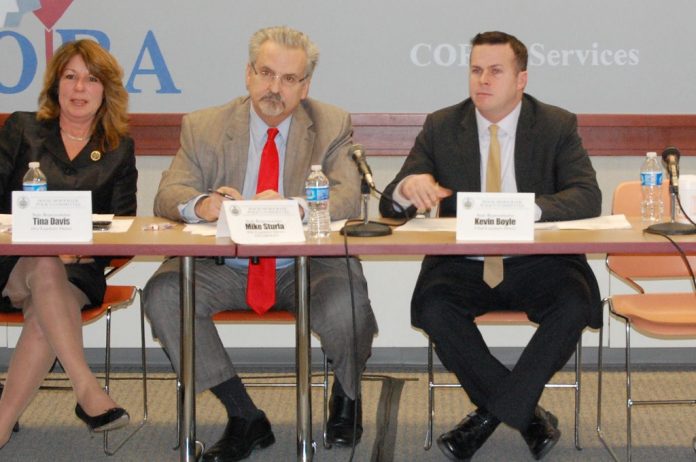When state Rep. Kevin Boyle canvassed the 172nd Legislative District in 2010 while campaigning against longtime incumbent John Perzel, he learned what most worries the people who live there.
Bobby Henon discovered the same primary concern among residents as he walked door-to-door in his 2011 campaign for City Council’s 6th District seat, which became available with the retirement of Joan Krajewski.
Boyle and Henon, both Democrats, each won their elections, largely on their shared interest in doing something about nuisance rental properties in Northeast neighborhoods like Tacony, Mayfair and Holmesburg.
Last week, Henon told state House members about his proposed remedies during a Democratic Policy Committee hearing organized by Boyle in the Northeast.
“Since I took office last year, I’ve been trying to bring to the attention of city officials a problem that’s affecting so many neighborhoods,” Boyle said after the Feb. 21 hearing at CORA Services in Fox Chase. “When I was going door to door, specifically in Mayfair, Tacony and Holmesburg, that’s really when I heard the complaints.”
Henon has a similar goal: “I want to identify the problem of nuisance property owners and neglectful tenants to the policy committee and say that I’m working on some things here in the city. And I hope [the state] does the same.”
The Democratic Policy Committee is a partisan group of House members that helps their caucus develop its legislative priorities for future House sessions. House terms are only two years, so Boyle is now in the midst of his first re-election campaign. Philadelphia public school teacher Dan Collins is challenging him in the primary, which is scheduled for April 24.
Specifically, Boyle and Henon are talking about properties that have been allowed to fall into disrepair and renters who seem to care little about living up to traditional community standards. Typically, nuisance properties may have overgrown weeds, trash or animal droppings in the yard. And they may be host to myriad disturbances such as loud music or drug activity.
Much of the hearing testimony alluded to so-called “absentee landlords” as a key component of the problem. In short, during the real estate boom of the early 2000s, many out-of-city and out-of-state speculators bought up properties in the affected neighborhoods. Meanwhile, many longtime residents were more than happy to sell their homes at inflated prices, leaving former neighbors to cope with a litany of renters.
“Since the influx of renters, the issues related to these renters have risen abundantly,” said Joe DeFelice, president of the Mayfair Civic Association and chairman of the Mayfair Community Development Corporation.
“No longer could a neighbor, in many cases, simply knock on a door and ask the person who answers the door to fix their sidewalk, put lids on their trash cans, turn their music down, etcetera. This became difficult because the amount of turnover in these rental properties produced new faces quite regularly,” he said.
Community leaders have tried to reach out to non-resident landlords with limited success. Some landlords play a shell game with their own contact information on public documents such as tax records and utility accounts, using tenants’ names and P.O. box addresses.
Other landlords are more responsive but can’t seem to keep tenants in line.
“I personally spent my last two Sundays on the phone with a landlord from Montgomery County about getting his tenants to be more respectful [to neighbors],” DeFelice testified. “This has led to both the landlord and Town Watch president staking out the house and documenting the issues, which range from loud music to abundant dog feces to using the back bedroom window as a trash shoot into the back yard.”
Henon said he intends to launch a series of initiatives to reign in nuisance property owners and tenants. On his Web site, bobbyhenon.com, the councilman has posted a “Bad Neighbor Map,” which marks properties in his district that have multiple city code violations or rental violations, and which have delinquent property taxes.
“I have data that proves a direct correlation between a property value decrease on blocks where there’s one property with three or more code violations,” Henon said.
He envisions an “aggressive PR campaign” warning landlords and renters to comply with city codes and ordinances or face possible sanctions such as the withholding of rent from landlords, fines and civil lawsuits.
“We want to educate everybody on what the laws are, almost like an amnesty period, then start going after the worst of the worst,” he said.
Boyle and his colleagues in Harrisburg are considering complementary state measures.
“The most exciting idea we’re looking into is suspending someone’s driver’s license for violating various housing codes. That would certainly get their attention,” Boyle said.
Legislators are also considering forcing landlords to put a “real address” rather than a P.O. box on property documents, while creating a state-mandated renter registry. Some municipalities already force landlords to register, but there is no statewide uniformity.
In the case of out-of-state landlords, there may be some federal relief available.
“I do think there are some interstate commerce issues that we haven’t explored,” Boyle said. ••





